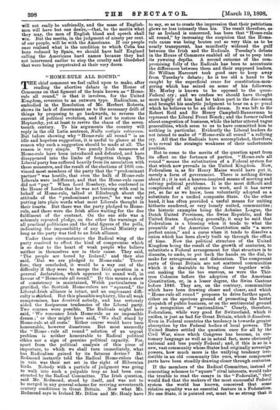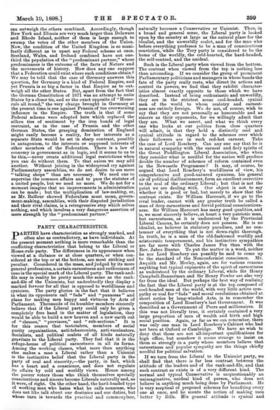"HOME-RULE ALL ROUND." T HE chief comment we feel called upon
to make, after reading the abortive debate in the House of Commons on that figment of the brain known as "Home- rule all round," is that it involves, for the -United Kingdom, reversion to an outworn type. Radicalism, as embodied in the Resolution of Mr. Herbert Roberts, shows its lack of discernment as to the necessary drift of things by proposing to go backwards, to reverse the current of political evolution, and if not to restore the Heptarchy, yet at least to revive the chaos of the seven- teenth century. To his arguments the country will reply in the old Latin sentence, Nulla vestigi,a retrorsum. But before showing why "Home-rule all round" is an idle and hopeless suggestion, it is useful to glance at the reason why such a suggestion should be made at all. The reason is very simple. Two purely Irish measures of Home-rule have been introduced and defeated, and have disappeared into the limbo of forgotten things. The Liberal party has suffered heavily from its association with these measures, and the result of the elections of 1895 con- vinced most members of the party that the "predominant partner" was hostile, that even the bulk of Home-rule Liberals were indifferent, and that the Home-rule cause did not "pay." When Lord Rosebery, who confessed in the House of Lords that he was not burning with zeal in behalf of Home-rule, talked at Edinburgh about the attitude of the "predominant partner," he was only putting into plain words what most Liberals thought in their hearts. But there was the party pledged to Home- rule, and there were the Irish allies waiting for the due fulfilment of the contract. On the one side was a solemnly repeated pledge, on the other the warnings of all practical politicians and the fatal figures of the polls, indicating the impossibility of any Liberal Ministry so long as the party was tied to an Irish alliance.
Under these circumstances the Radical wing of the party resolved to effect the kind of compromise which is so dear to the heart of weak people who believe neither in themselves nor in their cause. They said, The people are bored by Ireland,' and they also said, 'But we are pledged to Home-rule.' There- fore, they concluded, it would be a way out of the difficulty if they were to merge the Irish question in a general declaration, which appeared to sound well, in favour of "Home-rule all round." By this means a show of consistency is maintained, Welsh particularism is gratified, the Scottish Home-rulers are " squared," the Liberal-Irish alliance is intact, and an unpleasant diffi- culty is shirked. But this plausible sophistry, like all weak compromises, has deceived nobody, and has seriously aided the fissiparous tendencies of the Liberal party. Two courses were possible. The Radicals might have said, 'We renounce Irish Home-rule as an impossible dream ; ' or they might have said, We shall stand by Home-rule at all costs.' Either course would have been honourable, however disastrous. But most assuredly the "Home - rule all round" solution of an urgent problem is neither honourable to Radical political ethics nor a sign of genuine political capacity. For, apart from the political analysis of this piece of imposture, to which we shall turn immediately, what has Radicalism gained by its fatuous device ? Mr. Redmond instantly told the Radical Home-rulers that in vain was their net set in the sight of Hibernian birds. Nobody with a particle of judgment was going to walk into such a palpable trap as had been con- structed by the Radical Committee. The Irish question, said Mr. Redmond, stood by itself, and was not to be merged in any general scheme for reviving seventeenth century conditions in Great Britain. Now what Mr. Redmond says in Ireland Mr. Dillon and Mr. Healy have to say, so as to create the impression that their patriotism glows no less intensely than his. The result therefore, so far as Ireland is concerned, has been that "Home-rule all round," by increasing the suspicion that the Home- rule cause was being beaten out so very thin as to be nearly transparent, has manifestly widened the gulf between the Irish and the Radicals. Tuesday's debate in the House of Commons enabled all of us to peep into its yawning depths. A second outcome of the com- promising folly of the Radicals has been to accentuate the differences between them and their supposed leaders.
Sir William Harcourt took good care to keep away from Tuesday's debate ; he is too old a hand to be caught by the superficial craze for constitution-mon- gering which has seized on some of his followers.
Mr. Morley is known to be opposed to the quasi- Federal cry ; and we confess we should have thought more highly of him had he taken part in the discussion and brought his analytic judgment to bear on a pr ■ posal which he believes to be an idle dream. It was left to Sir Robert Reid and Sir Henry Campbell-Bannerman to represent the Liberal Front Bench ; and the former talked about congestion of business, while the latter uttered vague generalities, which seem to us to have committed him to nothing in particular. Evidently the Liberal leaders do not intend to make of "Home-rule all round" a rallying cry. All that the Radicals have accomplished, therefore, is to reveal the strategic weakness of their unfortunate position.
But to come to the merits of the question apart from its effect on the fortunes of parties. "Home-rule all round" means the substitution of a Federal system for that which now prevails in the -United Kingdom. Now, Federalism is, as Sir Henry Maine would have put it, merely a form of government. There is nothing divine about it ; it is not a heaven-inspired means of meeting and solving political problems. It is the most difficult and complicated of all systems to work, and it has never yet, so far as we know, been voluntarily adopted as a substitute for a unified composite State. On the other hand, it has often provided a useful means for uniting hitherto sundered, or very loosely united, communities ; the historic examples being the Achaian League, the Dutch United Provinces, the Swiss Republic, and the United States. Speaking generally, it may be said that Federalism is a blessing when it tends to what the preamble of the American Constitution calls "a more perfect union," and a curse when it tends to dissolve a union which has been slowly built up through the efflux of time. Now the political structure of the United Kingdom being the result of the growth of centuries, to substitute a Federal arrangement for that structure is to disunite, to undo, to put back the hands on the dial, to make for retrogression and dislocation. The component parts of Great Britain are not scattered communities which it is desirable to bring closer together with- out making the tie too onerous, as were the Thir- teen Colonies before the adoption of the American Constitution, or, in a lesser degree, the Swiss Cantons before 1848. They are, on the contrary, communities which have been drawing closer and closer, and which "Home-rule all round" proposes to drive further apart, either on the specious ground of promoting the better despatch of public business, or on the sentimental ground of a recognition of "nationalities." Clearly, therefore, Federalism, while very good for Switzerland, which it unifies, is just as bad for Great Britain, which it dissolves. Even in Federal countries the tendency is towards greater absorption by the Federal bodies of local powers. The United States settled the question once for all by the Civil War, since which Congress has become, in cus- tomary language as well as in actual fact, more obviously national and less purely Federal ; and, if this is so in a new, vast community whose States had originally sovereign powers, how much more is the unifying tendency irre- sistible in an old community like ours, whose component parts have been steadily drawing closer through centuries.
If the members of the Radical Committee, instead of concocting schemes to " square " rival interests, would take the trouble to read the essays in the "Federalist," they would find that the makers of the most successful Federal system the world has known, conceived that some relative equality was an essential feature in a Federation. No one State, it is pointed out, must be so strong that it can outweigh the others combined. Accordingly, though New York and Illinois are very much larger than Delaware and Rhode Island, neither of them is large enough to swamp the votes of the other members of the Union. Now, the condition of the United Kingdom is so mani- festly different as to upset any Federal scheme at once. Scotland, Wales, and Ireland combined have not one- third the population of the 'predominant partner," whose predominance is the outcome of the facts of Nature and the movements of history. How does any one suppose that a Federation could exist where such conditions obtain ? We may be told that the case of Germany answers this question, for Germany is a kind of Federal Empire, and yet Prussia is so big a factor in that Empire as to out- weigh all the other States. But, apart from the fact that the German Constitution of 1871 was an attempt to unite States by a closer tie, and so the exact opposite of "Home- rule all round," the very charge brought in Germany at the present time is one against Prussia of too overweening influence in the Empire. The truth is that if some Federal scheme were adopted here which replaced the silken ties of sentiment by the iron bonds of legal restraint, as in the case of Prussia and the other German States, the grasping domination of England might easily become a reality, for her interests as a separate State would be set in sharp contrast, possibly in antagonism, to the interests or supposed interests of other members of the Federation. There is a law of economy in government as in logic, and it seems to us to be this,—never create additional legal restrictions when you can do without them. To that axiom we may add another. Without joining in the widespread cry against Parliamentary assemblies, we do not desire to see more "talking shops" than are necessary. We need one to supervise the common affairs and to pass the statutes of a united people, but we need no more. We do not for a moment imagine that no improvements in administration can be made ; but the multiplication of law-making, or, as Mr. Balfour showed Federalism must mean, govern- ment-making, assemblies, with their disputed jurisdiction and their rival claims, is a retrogressive step which solves nothing, and which involves a very dangerous assertion of mere strength by the "predominant partner."







































 Previous page
Previous page